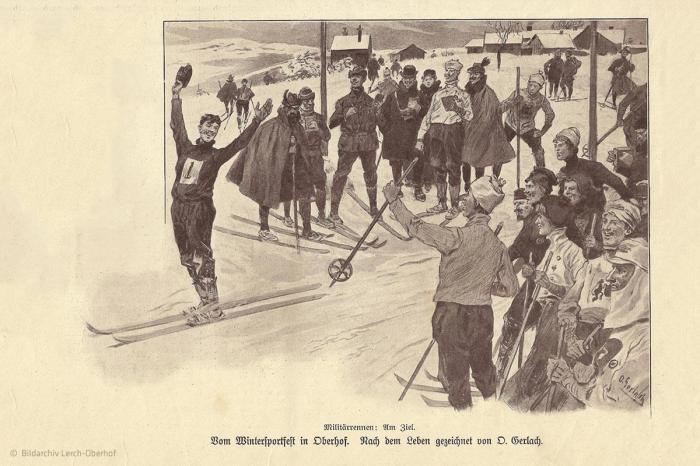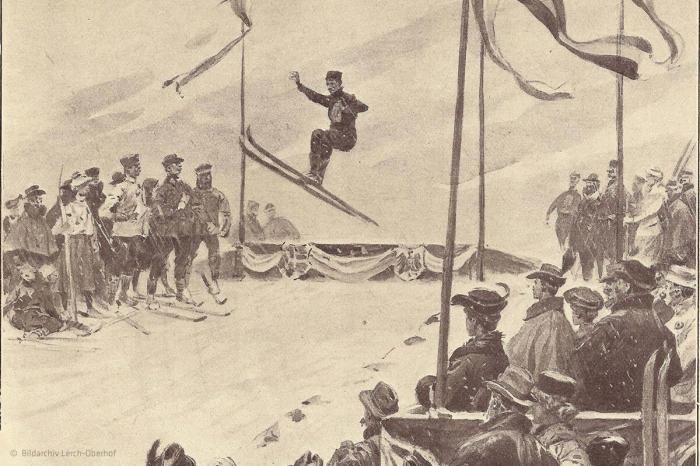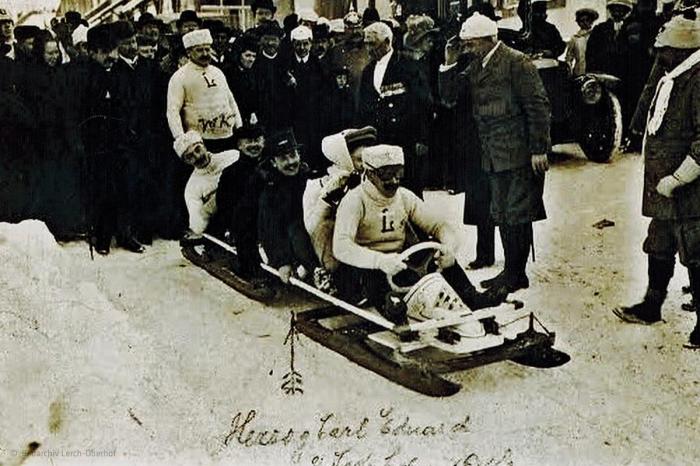Sports history(s)
Excerpt from the commemorative publication "Die Entwicklung des Wintersports im Thüringer Walde" (The Development of Winter Sports in the Thuringian Forest) by Max Ehrhardt from 1908, written on the occasion of the 24th birthday of His Royal Highness Duke Carl Eduard of Sachen-Coburg and Gotha on 19 July 1908.
The Sports Festivals (Races) of the Thuringian Winter Sports Association
All those who take winter sports seriously and strive to improve their performance are given the opportunity by the association to do so at the large winter sports festival which, according to the statutes, is to be held once a year in Oberhof and whose rich programme is spread over three to four days. The aim is to show to what degree of perfection the individual has reached, to measure himself against others and thus to be able to judge his own skills. He quickly finds out the points in which he is still behind the other competitors, and involuntarily he will strive to eliminate his arrears by the next sports festival, especially if he is looking at significant achievements. All this spurs on. Those, however, who show in an exemplary manner to what perfection human ability, strength and energy can bring in winter sports, return crowned with prizes, aware that they have silently converted many a person and taught them that they still have a lot to learn.
These marvellous feats of strength do not pass by without an effect on the spectators, who are always present in large numbers; a large number of them feel like becoming disciples of the sport themselves; thus, winter sports gain fresh growth at every festival. This is actually self-evident: among the numerous races, every kind of sport is represented and the spectator only needs to choose the one that seems most suitable to him for his personal practice. - It is in the nature of things that oral conversation at such festivals revolves around sport from morning till night; there is an instructive and at the same time captivating exchange of opinions about it; the experienced sportsman will be very happy to answer the questions of the still somewhat weak sports disciple or the newcomer.
When the day's work is finally done, the guests gather in the beautifully and meaningfully decorated halls, the acquaintances greet each other and celebrate a happy reunion with a commiseration, banquet and dance. In a room of the former Domänengasthof, well known to young and old, where the newly built stately Herzogliches Schloßhotel now stands as an ornament to Oberhof, the precious prizes for the races are displayed in stately numbers and cause a great attraction as objects of inspection. The closer the ceremonial hour of the prize-giving approaches, the higher the waves of enthusiasm beat; everyone, even previous opponents of winter sports, are carried away and join in the general merriment. When they return home, they tell of their experiences with joy in their hearts, and some of their listeners are already making plans to attend the next winter sports festival.
1st Sports Festival, 1906
The first sports festival was organised by the association on 3, 4 and 5 February 1906. The international championships for Thuringia in skiing and tobogganing, the international Rennsteig race, the association race, the military race, one ladies' race, one boys' race and one children's race each, an international bobsleigh race, and the final event was a wolf hunt. 156 participants took part in the 15 races, among them several foreigners, mainly 8 Norwegians. The festivities included a social event, a banquet, a Thuringian fair, a hunting breakfast and a sleigh ride to the Schmücke. The town of Oberhof was full of festive splendour, with serious and cheerful snow groups made by Weimar artists decorating the streets. As this was an unprecedented event in Thuringia, there was no lack of cautious restraint, either among the members of the association or those from further away, which even the authorities were not able to completely avoid, despite some concessions. In addition, the unfavourable snow conditions in Thuringia during the whole of the previous winter (1904/1905) contributed to the mistrust regarding the success of the festival. Under these circumstances, only a few helpers offered themselves to the festival management, but undaunted and with firm confidence in a great success, they steadfastly stuck to the set programme and the fixed date. The reliability of the winter in Oberhof as the crest of the Thuringian Forest proved to be the safest basic condition for the holding and success of an international winter sports festival. While violets and snowdrops were already blossoming in the valleys and plains below, and the Oberharz Ski Club had to cancel its winter sports festival at the last hour due to lack of snow, it could take place here with very abundant and favourable snow conditions.
The success was brilliant. This was primarily due to the sublime protector, His Royal Highness the reigning Duke Carl Eduard of Saxony Coburg and Gotha and his wife. On both days of the festival, the most illustrious dignitaries and their entourage honoured the event with their presence and spoke most graciously about the achievements of the association. Then it was Norway's smart sons who contributed to the great success of the festival and raised it to a respectable level, especially in terms of sport. But it was a special pleasure for all supporters of the association that despite the short existence of the association, very creditable performances were presented from its own ranks, which were not least a consequence of the preceding skiing course. Zella-Mehlis was able to pin the travelling prize on its skis in the association race, which was hard fought by Neuhaus a. R., while Brotterode with its most promising skier in the Rennsteig race (27.5 km) showed a performance that was only slightly inferior to that of the Norwegian sports friends. If these results already justified great hopes, it was an even more heart-warming sight to see with what confidence and boldness our youth moved on skis and bore witness to their serious striving for physical agility, courage and steely health. The military race, which was carried out by four non-commissioned officers of the 6th Thuringian Infantry Regiment No. 95 in a commendable manner, attracted particular interest; furthermore, the toboggan races, but above all the bobsleigh race, brought the liveliest excitement. This was the first bobsleigh race on a German track, and it was only now that a sport was introduced in Germany that had already found numerous and eager supporters in Switzerland for years. The social events - already mentioned above - were also well attended, took place in a cheerful, unclouded mood and offered plenty of variety even for those not involved in sports. The festival had an enormous attraction from Thuringia and far beyond its borders: about 4,000 people had flocked here, official authorities had sent their representatives, the press, which pays homage to sport and illustration, had sent their most competent experts and illustrators.
Of course, there was no shortage of malcontents and grumblers who were in the habit of demanding perfection "at the drop of a hat" - but that was to be expected from the outset. The festival management itself was first and foremost aware of the fact that there would be a lot of things to show for this first event, but with the lack of suitable and hard-working helpers and with the generally somewhat wide-hearted confidence, despite excessive work, with the best will in the world no more could be achieved. The success achieved and the experience gained to the greatest possible extent were an incentive for the members of the main executive committee to try to erase the mistakes made in the future.
2nd Sports Festival, 1907
The second sports festival of the association took place from 1st to 4th February 1907, again glorified by the presence of the High Protector and his wife, as well as distinguished by the presence of Their Royal Highnesses Prince Friedrich Karl and Friedrich Sigismund of Prussia and honoured by the participation of representatives of the high state authorities, it took place in splendid winter weather. Thanks to the kindness of the Royal Railway Directorate of Erfurt, extra trains provided comfortable and punctual transport for the large crowds of spectators. The entry lists for all races showed a much higher number of entries than last year, the sporting participation and the performances were very pleasing, and these also resulted in significant progress. The challenge trophy in the association race on skis was once again won by the Zella local group. Furthermore, the association had the great honour of being honoured by His Imperial Highness the Crown Prince of the German Empire. Highness the Crown Prince of the German Empire and Prussia donated a golden cup as a challenge trophy for the international bobsleigh race for the championship of Germany; its lucky winner was the bobsleigh "Deutscher Michel". - For the first time, a race on skis with a harnessed horse was held: Schijöring, which had three participants and aroused much interest.
3rd Sports Festival, 1908
The third festival of the association took place from 31 January to 3 February 1908. The races took place for the first time on the tracks built in the immediate vicinity of Oberhof, which, with the exception of a few minor defects that still need to be remedied, have proved themselves most brilliantly. The High Protector Duke Carl Eduard once again honoured the festival with his presence. He appeared with a large entourage. The crowd, especially to the new jumping hill, was enormous. The recently built grandstands were almost full. Fifteen races were scheduled, in which 297 people took part (156 at the first federation festival). The race programme included innovations an obstacle race on skis for foresters and a sledge parade with beauty prizes; [...].
The challenge trophy in the association race on skis was won by the local group Ernstthal. The prize donated by His Imperial Highness the Crown Prince. Hoheit dem Kronprinzen as a challenge trophy in the bobsleigh race was won by the bobsleigh "Langer Tom".






